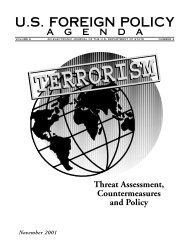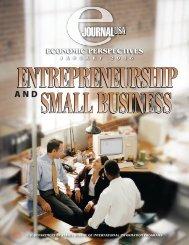s. history us history us history - Embassy of the United States
s. history us history us history - Embassy of the United States
s. history us history us history - Embassy of the United States
- No tags were found...
You also want an ePaper? Increase the reach of your titles
YUMPU automatically turns print PDFs into web optimized ePapers that Google loves.
CHAPTER 4: THE FORMATION OF A NATIONAL GOVERNMENTOUTLINE OF U.S. HISTORYI have <strong>of</strong>ten in <strong>the</strong> course <strong>of</strong> <strong>the</strong>session ... looked at that [chair]behind <strong>the</strong> president, withoutbeing able to tell whe<strong>the</strong>r it wasrising or setting; but now, atlength, I have <strong>the</strong> happiness toknow that it is a rising, and not asetting, sun.The convention was over; <strong>the</strong>members “adjourned to <strong>the</strong> CityTavern, dined toge<strong>the</strong>r, and tooka cordial leave <strong>of</strong> each o<strong>the</strong>r.” Yeta crucial part <strong>of</strong> <strong>the</strong> struggle for amore perfect union remained tobe faced. The consent <strong>of</strong> popularlyelected state conventions was stillrequired before <strong>the</strong> document couldbecome effective.The convention had decided that<strong>the</strong> Constitution would take effectupon ratification by conventions innine <strong>of</strong> <strong>the</strong> 13 states. By June 1788<strong>the</strong> required nine states had ratified<strong>the</strong> Constitution, but <strong>the</strong> large states<strong>of</strong> Virginia and New York had not.Most people felt that without <strong>the</strong>irsupport <strong>the</strong> Constitution would neverbe honored. To many, <strong>the</strong> documentseemed full <strong>of</strong> dangers: Wouldnot <strong>the</strong> strong central governmentthat it established tyrannize <strong>the</strong>m,oppress <strong>the</strong>m with heavy taxes, anddrag <strong>the</strong>m into wars?Differing views on <strong>the</strong>se questionsbrought into existence twoparties, <strong>the</strong> Federalists, who favoreda strong central government, and <strong>the</strong>Antifederalists, who preferred a looseassociation <strong>of</strong> separate states. Impassionedarguments on both sides werevoiced by <strong>the</strong> press, <strong>the</strong> legislatures,and <strong>the</strong> state conventions.In Virginia, <strong>the</strong> Antifederalistsattacked <strong>the</strong> proposed new governmentby challenging <strong>the</strong> openingphrase <strong>of</strong> <strong>the</strong> Constitution: “We<strong>the</strong> People <strong>of</strong> <strong>the</strong> <strong>United</strong> <strong>States</strong>.”Without <strong>us</strong>ing <strong>the</strong> individual statenames in <strong>the</strong> Constitution, <strong>the</strong> delegatesargued, <strong>the</strong> states would notretain <strong>the</strong>ir separate rights or powers.Virginia Antifederalists were ledby Patrick Henry, who became <strong>the</strong>chief spokesman for back-countryfarmers who feared <strong>the</strong> powers <strong>of</strong><strong>the</strong> new central government. Waveringdelegates were persuaded bya proposal that <strong>the</strong> Virginia conventionrecommend a bill <strong>of</strong> rights,and Antifederalists joined with <strong>the</strong>Federalists to ratify <strong>the</strong> Constitutionon June 25.In New York, Alexander Hamilton,John Jay, and James Madisonp<strong>us</strong>hed for <strong>the</strong> ratification <strong>of</strong> <strong>the</strong>Constitution in a series <strong>of</strong> essaysknown as The Federalist Papers.The essays, published in New Yorknewspapers, provided a now-classicargument for a central federal government,with separate executive,legislative, and judicial branches thatchecked and balanced one ano<strong>the</strong>r.With The Federalist Papers influencing<strong>the</strong> New York delegates, <strong>the</strong> Constitutionwas ratified on July 26.Antipathy toward a strong centralgovernment was only oneconcern among those opposed to<strong>the</strong> Constitution; <strong>of</strong> equal concernto many was <strong>the</strong> fear that <strong>the</strong>Constitution did not protect individualrights and freedoms sufficiently.Virginian George Mason, author<strong>of</strong> Virginia’s Declaration <strong>of</strong> Rights<strong>of</strong> 1776, was one <strong>of</strong> three delegatesto <strong>the</strong> Constitutional Conventionwho had ref<strong>us</strong>ed to sign <strong>the</strong> finaldocument beca<strong>us</strong>e it did not enumerateindividual rights. Toge<strong>the</strong>rwith Patrick Henry, he campaignedvigoro<strong>us</strong>ly against ratification <strong>of</strong> <strong>the</strong>Constitution by Virginia. Indeed,five states, including Massach<strong>us</strong>etts,ratified <strong>the</strong> Constitution on <strong>the</strong> conditionthat such amendments beadded immediately.When <strong>the</strong> first Congress convenedin New York City in September1789, <strong>the</strong> calls for amendmentsprotecting individual rights werevirtually unanimo<strong>us</strong>. Congressquickly adopted 12 such amendments;by December 1791, enoughstates had ratified 10 amendmentsto make <strong>the</strong>m part <strong>of</strong> <strong>the</strong> Constitution.Collectively, <strong>the</strong>y are knownas <strong>the</strong> Bill <strong>of</strong> Rights. Among <strong>the</strong>irprovisions: freedom <strong>of</strong> speech, press,religion, and <strong>the</strong> right to assemblepeacefully, protest, and demandchanges (First Amendment); protectionagainst unreasonable searches,seizures <strong>of</strong> property, and arrest(Fourth Amendment); due process<strong>of</strong> law in all criminal cases (FifthAmendment); right to a fair andspeedy trial (Sixth Amendment);protection against cruel and un<strong>us</strong>ualpunishment (Eighth Amendment);and provision that <strong>the</strong> people retainadditional rights not listed in <strong>the</strong>Constitution (Ninth Amendment).Since <strong>the</strong> adoption <strong>of</strong> <strong>the</strong> Bill<strong>of</strong> Rights, only 17 more amendmentshave been added to <strong>the</strong>Constitution. Although a number <strong>of</strong><strong>the</strong> subsequent amendments revised<strong>the</strong> federal government’s structureand operations, most followed <strong>the</strong>precedent established by <strong>the</strong> Bill<strong>of</strong> Rights and expanded individualrights and freedoms.PRESIDENT WASHINGTONOne <strong>of</strong> <strong>the</strong> last acts <strong>of</strong> <strong>the</strong> Congress<strong>of</strong> <strong>the</strong> Confederation was to arrangefor <strong>the</strong> first presidential election, settingMarch 4, 1789, as <strong>the</strong> date that<strong>the</strong> new government would comeinto being. One name was on everyone’slips for <strong>the</strong> new chief <strong>of</strong> state,George Washington. He was unanimo<strong>us</strong>lychosen president and took<strong>the</strong> oath <strong>of</strong> <strong>of</strong>fice at his inaugurationon April 30, 1789. In words spokenby every president since, Washingtonpledged to execute <strong>the</strong> duties <strong>of</strong><strong>the</strong> presidency faithfully and, to <strong>the</strong>best <strong>of</strong> his ability, to “preserve, protect,and defend <strong>the</strong> Constitution <strong>of</strong><strong>the</strong> <strong>United</strong> <strong>States</strong>.”When Washington took <strong>of</strong>fice,<strong>the</strong> new Constitution enjoyed nei<strong>the</strong>rtradition nor <strong>the</strong> full backing <strong>of</strong>organized public opinion. The newgovernment had to create its ownmachinery and legislate a system <strong>of</strong>taxation that would support it. Untila judiciary could be established, lawscould not be enforced. The army wassmall. The navy had ceased to exist.Congress quickly created <strong>the</strong>departments <strong>of</strong> State and Treasury,with Thomas Jefferson and AlexanderHamilton as <strong>the</strong>ir respectivesecretaries. Departments <strong>of</strong> War7677












